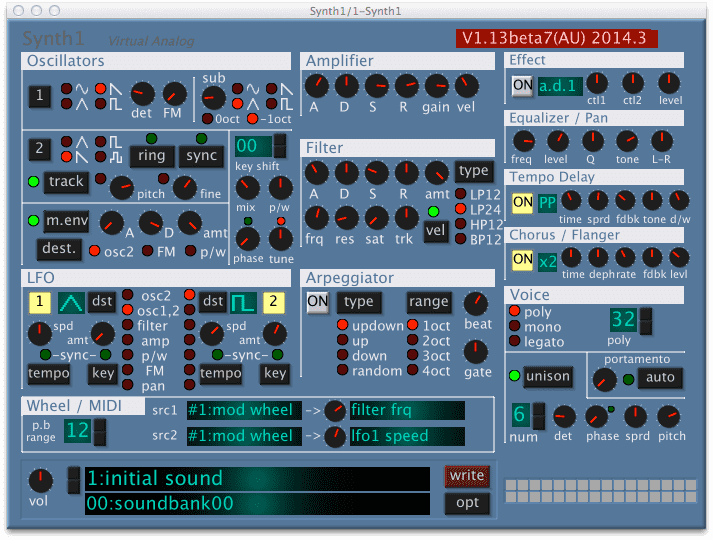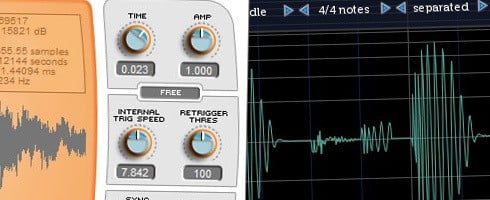
Most of the software we are developing here at Smartelectronix is made in the form of plugins. Now, what is a plugin? Plugins are used by a lot of different types of software. They are a convenient way to add a feature to an existing application.


Most of the software we are developing here at Smartelectronix is made in the form of plugins.
Now, what is a plugin? Plugins are used by a lot of different types of software. They are a convenient way to add a feature to an existing application. For example, you are probably pretty familiar with some web browser plugins like Macromedia's Flash and Apple's QuickTime. These let you see additional types of stuff, like movies and animations, within your web browser. Photoshop users are also probably familiar with the many additional plugins available which add extra visual effects that can be used within Photoshop. A plugin is extra software that 'plugs in' to some other software. A plugin requires 'host' software in order to be used; it cannot be used alone. A 'host' is software that can load the plugins and allow you to make use of them. In the previous examples, web browsers and Photoshop are hosts.
Some plugin formats are 'open', meaning that any developers can get the necessary information to make plugins in that format or add support for using those plugins into a host. Some plugin formats are 'closed' and hence usually only usable within one person's or company's host software.
Our plugins are all for music or audio stuff. Most of them are audio effects, but a few are audio instruments and a few others are MIDI effects. We make plugins because, sometimes when you have an idea, it is way more convenient to make it as a plugin rather than creating a new application from scratch. In addition to that, when you use an open plugin format, you get the advantage of being able to use the same plugin in a variety of hosts. In the case of music software, a lot of us use many different applications for different tasks. For example, you might use Handy Audio Editor Pro|24 for editing your sample sounds, and then use Quicky Song Makerizer to arrange them and mix them together into a song, and then Power Solutions Xtreme Forcefield to master your song. If all of these applications support the same open plugin format (which tends to be the case in the music software world), then that means that you can use your distortion plugin at any point in your music making process, regardless of which application you're using at the moment. This is a very nice advantage of plugins!
A few common music plugin formats are Steinberg's Virtual Studio Technology (VST), Apple's Audio Unit (AU), and Micro$oft's DirectX (DX). These are all open formats and are supported by a wide variety of hosts. Unfortunately, there is still no single music plugin standard. The above are all owned and controlled by private companies, they are all limited on which operating systems they can be used, and they vary in degrees of their 'completeness' or usability for different tasks.
Now, what is a plugin? Plugins are used by a lot of different types of software. They are a convenient way to add a feature to an existing application. For example, you are probably pretty familiar with some web browser plugins like Macromedia's Flash and Apple's QuickTime. These let you see additional types of stuff, like movies and animations, within your web browser. Photoshop users are also probably familiar with the many additional plugins available which add extra visual effects that can be used within Photoshop. A plugin is extra software that 'plugs in' to some other software. A plugin requires 'host' software in order to be used; it cannot be used alone. A 'host' is software that can load the plugins and allow you to make use of them. In the previous examples, web browsers and Photoshop are hosts.
Some plugin formats are 'open', meaning that any developers can get the necessary information to make plugins in that format or add support for using those plugins into a host. Some plugin formats are 'closed' and hence usually only usable within one person's or company's host software.
Our plugins are all for music or audio stuff. Most of them are audio effects, but a few are audio instruments and a few others are MIDI effects. We make plugins because, sometimes when you have an idea, it is way more convenient to make it as a plugin rather than creating a new application from scratch. In addition to that, when you use an open plugin format, you get the advantage of being able to use the same plugin in a variety of hosts. In the case of music software, a lot of us use many different applications for different tasks. For example, you might use Handy Audio Editor Pro|24 for editing your sample sounds, and then use Quicky Song Makerizer to arrange them and mix them together into a song, and then Power Solutions Xtreme Forcefield to master your song. If all of these applications support the same open plugin format (which tends to be the case in the music software world), then that means that you can use your distortion plugin at any point in your music making process, regardless of which application you're using at the moment. This is a very nice advantage of plugins!
A few common music plugin formats are Steinberg's Virtual Studio Technology (VST), Apple's Audio Unit (AU), and Micro$oft's DirectX (DX). These are all open formats and are supported by a wide variety of hosts. Unfortunately, there is still no single music plugin standard. The above are all owned and controlled by private companies, they are all limited on which operating systems they can be used, and they vary in degrees of their 'completeness' or usability for different tasks.
Freeware And Software Downloads
Most of the software we are developing here at Smartelectronix is made in the form of plugins.
Now, what is a plugin? Plugins are used by a lot of different types of software. They are a convenient way to add a feature to an existing application. For example, you are probably pretty familiar with some web browser plugins like Macromedia's Flash and Apple's QuickTime. These let you see additional types of stuff, like movies and animations, within your web browser. Photoshop users are also probably familiar with the many additional plugins available which add extra visual effects that can be used within Photoshop. A plugin is extra software that 'plugs in' to some other software. A plugin requires 'host' software in order to be used; it cannot be used alone. A 'host' is software that can load the plugins and allow you to make use of them. In the previous examples, web browsers and Photoshop are hosts.
Some plugin formats are 'open', meaning that any developers can get the necessary information to make plugins in that format or add support for using those plugins into a host. Some plugin formats are 'closed' and hence usually only usable within one person's or company's host software.
Our plugins are all for music or audio stuff. Most of them are audio effects, but a few are audio instruments and a few others are MIDI effects. We make plugins because, sometimes when you have an idea, it is way more convenient to make it as a plugin rather than creating a new application from scratch. In addition to that, when you use an open plugin format, you get the advantage of being able to use the same plugin in a variety of hosts. In the case of music software, a lot of us use many different applications for different tasks. For example, you might use Handy Audio Editor Pro|24 for editing your sample sounds, and then use Quicky Song Makerizer to arrange them and mix them together into a song, and then Power Solutions Xtreme Forcefield to master your song. If all of these applications support the same open plugin format (which tends to be the case in the music software world), then that means that you can use your distortion plugin at any point in your music making process, regardless of which application you're using at the moment. This is a very nice advantage of plugins!
A few common music plugin formats are Steinberg's Virtual Studio Technology (VST), Apple's Audio Unit (AU), and Micro$oft's DirectX (DX). These are all open formats and are supported by a wide variety of hosts. Unfortunately, there is still no single music plugin standard. The above are all owned and controlled by private companies, they are all limited on which operating systems they can be used, and they vary in degrees of their 'completeness' or usability for different tasks.
Now, what is a plugin? Plugins are used by a lot of different types of software. They are a convenient way to add a feature to an existing application. For example, you are probably pretty familiar with some web browser plugins like Macromedia's Flash and Apple's QuickTime. These let you see additional types of stuff, like movies and animations, within your web browser. Photoshop users are also probably familiar with the many additional plugins available which add extra visual effects that can be used within Photoshop. A plugin is extra software that 'plugs in' to some other software. A plugin requires 'host' software in order to be used; it cannot be used alone. A 'host' is software that can load the plugins and allow you to make use of them. In the previous examples, web browsers and Photoshop are hosts.
Some plugin formats are 'open', meaning that any developers can get the necessary information to make plugins in that format or add support for using those plugins into a host. Some plugin formats are 'closed' and hence usually only usable within one person's or company's host software.
Our plugins are all for music or audio stuff. Most of them are audio effects, but a few are audio instruments and a few others are MIDI effects. We make plugins because, sometimes when you have an idea, it is way more convenient to make it as a plugin rather than creating a new application from scratch. In addition to that, when you use an open plugin format, you get the advantage of being able to use the same plugin in a variety of hosts. In the case of music software, a lot of us use many different applications for different tasks. For example, you might use Handy Audio Editor Pro|24 for editing your sample sounds, and then use Quicky Song Makerizer to arrange them and mix them together into a song, and then Power Solutions Xtreme Forcefield to master your song. If all of these applications support the same open plugin format (which tends to be the case in the music software world), then that means that you can use your distortion plugin at any point in your music making process, regardless of which application you're using at the moment. This is a very nice advantage of plugins!
A few common music plugin formats are Steinberg's Virtual Studio Technology (VST), Apple's Audio Unit (AU), and Micro$oft's DirectX (DX). These are all open formats and are supported by a wide variety of hosts. Unfortunately, there is still no single music plugin standard. The above are all owned and controlled by private companies, they are all limited on which operating systems they can be used, and they vary in degrees of their 'completeness' or usability for different tasks.